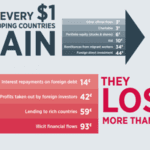Governor of the Bank of Ghana (BoG) Dr. Ernest Addison, has voiced his concerns regarding the slow pace of prosecution for shareholders of banks and financial institutions implicated in the misappropriation of depositors’ funds.
These actions warranted a significant cleanup of the financial sector, yet many of those responsible have yet to face justice.
During a joint press conference with the Ministry of Finance and the International Monetary Fund (IMF), Dr. Addison emphasized the need for more prompt and decisive action to address these cases.
“It is taking a really long time to bring all of the implicated individuals to book,” he stated, urging the legal system to act swiftly and decisively.
He pointed out that large amounts of money used in the financial sector cleanup are still held in assets by the shareholders.
“I think that the law needs to be allowed to do its work,” Dr. Addison remarked, stressing that the state must persevere and pursue these shareholders who have misappropriated depositors’ funds.
He underscored the importance of accountability and holding individuals responsible for their actions and inactions.
Affected institutions
The BoG revoked the licenses of nine commercial banks, 347 microfinance institutions, 23 insolvent savings and loans companies, finance houses, and 39 microcredit institutions as part of the cleanup.
GH¢25bn cleanup cost
The government spent GH¢25 billion on the financial sector cleanup, covering banks, savings and loans, microfinance companies, and specialized deposit-taking financial institutions (SDIs).
By the end of the first quarter of 2020, a total of GH¢13.6 billion (3.5% of GDP) had been spent on the cleanup.
An additional GH¢5 billion was spent on the President’s directives to fully pay all depositors whose funds were locked up with the failed SDIs and MFIs, bringing the total expenditure on financial sector interventions to GH¢18.6 billion (4.8% of GDP) as of June 2020.
The government also committed GH¢3.1 billion (0.78% of GDP) to support investors in failed asset management companies regulated by the Securities and Exchange Commission (SEC). This brought the overall total government expenditure for the failed financial institutions to GH¢21.60 billion (5.6% of GDP) by 2021.
Additional expenditures brought the final amount to GH¢25 billion.
Ato Essien jailed 15 years
One notable case involved William Ato Essien, the former CEO of the defunct Capital Bank, who was sentenced to 15 years imprisonment for stealing GH₵90 million.
Despite facing 23 counts, his partial refund of the money and other mitigating factors resulted in a reduced sentence, with some sentences running concurrently.
However, Essien’s accomplices, Tetteh Nettey, Managing Director of MS Management Service, and Rev. Fitzgerald Odonkor, former Managing Director of Capital Bank, were acquitted and discharged by the court.
Beige Bank‘s Michael Nyinaku on trial
In another high-profile case, Michael Nyinaku, the former CEO of the liquidated Beige Bank, has been charged with 44 counts, including stealing, fraudulent breach of trust, and money laundering.
Over GH¢2.1 billion was allegedly stolen, laundered, or lost through fraudulent breach of trust by Nyinaku.
The charges
Of the 44 counts against Nyinaku, the first nine relate to stealing under Section 124(1) of the Criminal Offences Act 1960 (Act 29). Counts ten to 34 concern fraudulent breach of trust under Section 128 of the same act, and counts 35 to 43 involve money laundering under Section 1(1)(c) of the Anti-Money Laundering Act 2020 (Act 1044).
- Friday, April 25, 2025 Newspaper Headlines - 25 April 2025
- Valeria, the amputee giving 1,000 other amputees new life - 25 April 2025
- Moses Baiden calls for unified African tech strategy - 25 April 2025




